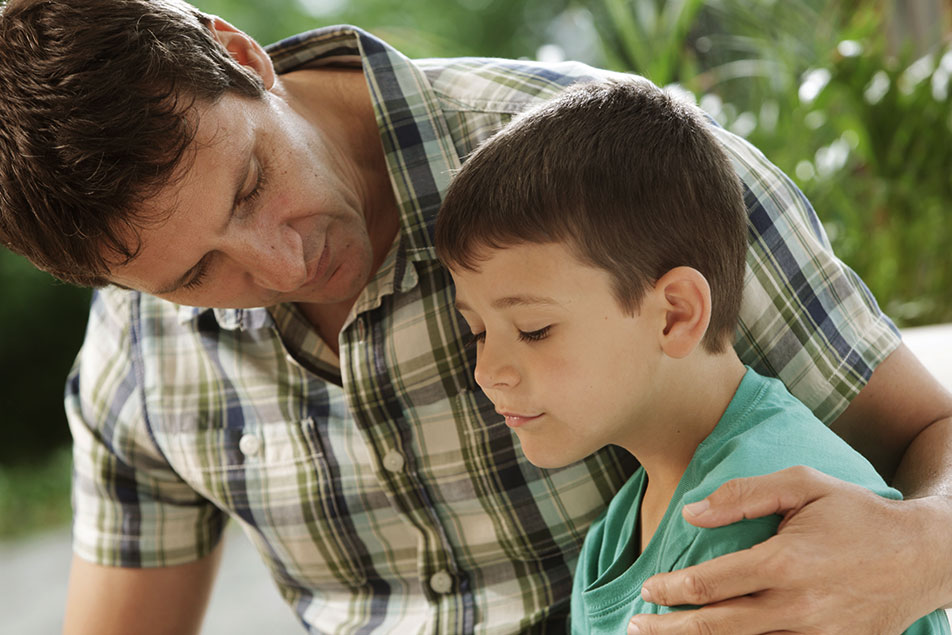When it’s the parent who is sick
The younger the child, the simpler the information should be. As an example, let’s say that a parent has been diagnosed with Lyme or another tick-borne illness. They need to tell their child what is going on without creating unnecessary fear.
They might start with the following: “You might have noticed that Mommy/Daddy has been spending a lot of time in bed. You know how when you are sick sometimes, you just don’t feel good? That’s what Mommy’s/Daddy’s sickness is like. It kind of zaps her/his energy. Mommy/Daddy is working with a doctor to feel better. It may take a bit of time. Some days will be good, and some days will be bad, but Mommy/Daddy will get healthy eventually. So you don’t have to worry. And you can bring me all your questions or problems. I am always here for you.”
Children who are slightly older might want to know what happened to cause the illness. A parent might say something like, “Mommy/Daddy got sick because a tick bit her/him, and they can give you different kinds of sicknesses.”
If the child seems anxious that they might themselves become ill, the parental response can be informative and empathetic, such as, “Ticks can be dangerous, but we can take steps to avoid bites and still enjoy going outdoors. That’s why when you go outside, Mommy and Daddy make you wear certain types of clothing and spray you with repellent—we want to make sure the bugs leave you alone.”
A child might ask follow-up questions about what happens if they do get bitten by a tick. Answering matter-of-factly can put a check on their fear before it spins out of control. For example, a parent might respond, “That’s why we do regular tick checks after being outdoors so that if you do get bitten, we remove the tick quickly and safely. If you ever notice a tick bite, you can tell me, your other parent, a teacher, or another responsible adult, and we will help you take care of it.”
A child may be worried about specific symptoms. It’s important to address their concerns directly: “Mommy/Daddy is sick, so she/he doesn’t feel good. Mommy/Daddy may be more tired than other kids’ parents. So sometimes I may have other parents pick you up from school or activities, but I’m always here. I’m not going anywhere.”
If a child notices that their sick parent is going to a lot of doctor appointments, you can soothe their anxieties by saying something like, “It’s normal to wonder why Mommy/Daddy is going to the doctor more often these days. Nothing has changed or gotten worse. Mommy/Daddy is just trying to take good care of herself/himself so that she/he can be healthy for you. I love you. We’re a team, and we will beat this infection together.”
Dr. Greenberg adds, “You’ve got to think on their level about how much and what information they can take in and how they can understand it.” With children getting access to the internet at increasingly younger ages, it can be easy to go down a rabbit hole of fear and paranoia (as many of us adults can relate to!).
When a sibling is sick
Much of the advice above applies to explaining to the healthy child why their sibling is sick and what to expect. However, when there is more than one child in the family, and one of the children is sick, it is often the siblings that suffer the most. Dr. Greenberg elaborates, “Sometimes, parents can tell what the sick kid’s mood is like because if they’re getting along and playing well with a sibling, that means their mood’s pretty good. But when they’re full of anger, be it out of depression or extra agitation, the sibling can get it—they’re the victim. So, it can be really tough.”
Of course, parents must advocate for their sick children, and that can take up a lot of their time and focus. However, it’s important to remember that you have another child who needs your attention, too, because this is a hard experience for the whole family. Remember to check in regularly with your healthy child. Ask how they are doing and let them talk freely about their feelings and how the experience is affecting them.
It can be difficult but try to make time for non-sick activities where you can bond with your children. In her work with families that are struggling with Lyme and tick-borne disease-related mental health issues, Dr. Greenberg emphasizes, “I don’t want them to feel like they’re a Lyme family and that’s what identifies them all.”
When the child themselves is sick
Early signs of Lyme disease in children include flu-like symptoms, such as fever, chills, head and neck pain, body aches (muscle and joint), malaise, and fatigue. Given that children may have a harder time conveying how and what they are feeling, these symptoms may be mistaken for irritability or viral infections, such as the flu or COVID.
A rash can also be a clear sign of Lyme disease. However, only 27% to 80% of patients will present with a rash, with a lesser percentage developing the classic “bulls-eye” rash. It is especially important to check the scalp and skin-fold areas (groin, armpits, behind the knees, and ears) so that a rash isn’t missed.
Lyme disease and other tick-borne infections can also spread to the central nervous system, causing a host of mental health issues. Infection-related rage is extremely common. However, even when a child is sick, they have to find a way to have some self-control. To learn more about diagnosing Lyme in children, check out this resource.
Dr. Greenberg advises parents to talk openly with children about their rage: “You’re a good kid. I know that the bugs are making you upset. They make you more angry, and that’s not fair. It can seem like you’re totally out of control. Mommy and Daddy are going to help you. Because if you yell at us, that’s not great, but we’re family. If you yell at your teachers, then you’re not going to do well in school. If you yell at your friends, then you’re going to feel really bad. So it’s important to talk to Mommy and Daddy. And if we need to get a doctor’s help for you to feel less angry, that’s OK. We will do whatever we need to do to help you feel better.”
Conclusion
Lyme disease and other tick-borne infections can have devastating effects not only on the person who is sick but on the entire family. Parents don’t want to scare their children, but they do want them to have the information they need to understand what is going on and feel comforted that even though the family is going through a difficult time right now, they will overcome it together.
By remembering what children really need—to know that their sick loved one isn’t dying, they aren’t to blame for their loved one’s illness, and they aren’t going to become sick themselves just by being around it—parents can tailor their responses to suit their individual child’s age and personality. Above all, just being present and supportive can make a huge difference in how your child processes the news and how resilient they are.



